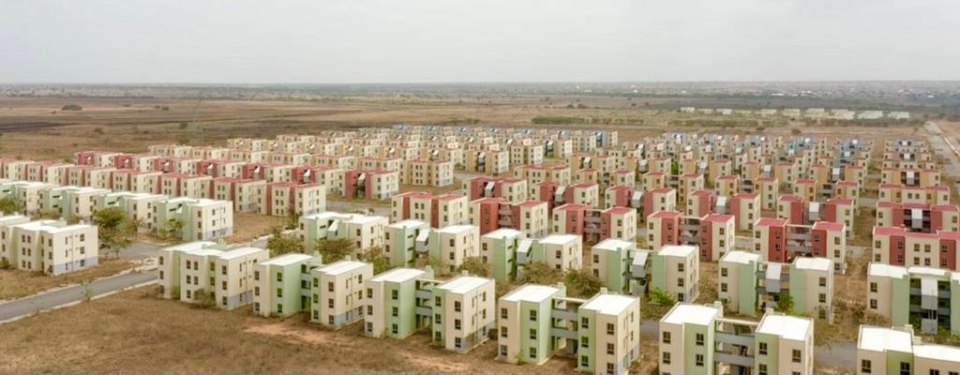Only 1% of Households in Ghana Can Afford Decent Homes – 2024 Housing Profile Report
Friday, 29 November 2024 | Ghana

According to the 2024 Revised Ghana Housing Profile, only 1% of households in Ghana can afford decent homes, as defined by the Ministry of Works and Housing. The report, launched in collaboration with UN Habitat and the United Nations Office for Project Services (UNOPS), paints a stark picture of the country’s housing sector.
A decent home, as outlined in the profile, is one that provides sufficient space for all inhabitants, is secure against forced eviction, is free from hazards, and offers access to basic needs like water, electricity, and sanitation facilities. Additionally, it must be located in a safe environment.
Compiled with data from institutions such as the Ghana Statistical Service (GSS), the housing profile sheds light on critical issues affecting housing in Ghana. It also proposes potential solutions to address these challenges.
The Minister for Works and Housing, Kojo Oppong Nkrumah, expressed hope that the findings of the report would influence the country’s development agenda and spur policy reforms in the housing sector. He emphasized that the document should serve as a blueprint for coordinated action, guiding the sector toward a future that meets the aspirations of all Ghanaians.
“These are contributions to the body of knowledge in housing that should influence the interventions we roll out. Let this document serve as a blueprint for coordinated action guiding us towards a housing sector that meets the aspirations of every Ghanaian,” said Kojo Oppong Nkrumah during the report’s launch at the Alisa Hotel in Accra on Wednesday, November 27, 2024.
Professor Clifford Amoako, the lead author and consultant of the revised profile, expanded on some of the key issues raised in the report. These included:
Only 1% of Ghanaian households can afford decent homes provided by the formal sector, such as those built by real estate developers.
11% of expensive homes bought by people remain largely empty.
The housing deficit, which stood at 2.8 million units a decade ago, has decreased to 1.8 million units, reflecting a reduction of 1 million units over the past 10 years.
While acknowledging the challenges, the Works and Housing Minister emphasized that the revised housing profile is a diagnosis of the sector, offering recommendations for improvement. He called for the active involvement of the private sector and other stakeholders in addressing the issues highlighted in the report.
“The involvement of the private sector and all other stakeholders will be crucial in addressing the defaults highlighted in this report,” Kojo Oppong Nkrumah added.
A decent home, as outlined in the profile, is one that provides sufficient space for all inhabitants, is secure against forced eviction, is free from hazards, and offers access to basic needs like water, electricity, and sanitation facilities. Additionally, it must be located in a safe environment.
Compiled with data from institutions such as the Ghana Statistical Service (GSS), the housing profile sheds light on critical issues affecting housing in Ghana. It also proposes potential solutions to address these challenges.
The Minister for Works and Housing, Kojo Oppong Nkrumah, expressed hope that the findings of the report would influence the country’s development agenda and spur policy reforms in the housing sector. He emphasized that the document should serve as a blueprint for coordinated action, guiding the sector toward a future that meets the aspirations of all Ghanaians.
“These are contributions to the body of knowledge in housing that should influence the interventions we roll out. Let this document serve as a blueprint for coordinated action guiding us towards a housing sector that meets the aspirations of every Ghanaian,” said Kojo Oppong Nkrumah during the report’s launch at the Alisa Hotel in Accra on Wednesday, November 27, 2024.
Professor Clifford Amoako, the lead author and consultant of the revised profile, expanded on some of the key issues raised in the report. These included:
Only 1% of Ghanaian households can afford decent homes provided by the formal sector, such as those built by real estate developers.
11% of expensive homes bought by people remain largely empty.
The housing deficit, which stood at 2.8 million units a decade ago, has decreased to 1.8 million units, reflecting a reduction of 1 million units over the past 10 years.
While acknowledging the challenges, the Works and Housing Minister emphasized that the revised housing profile is a diagnosis of the sector, offering recommendations for improvement. He called for the active involvement of the private sector and other stakeholders in addressing the issues highlighted in the report.
“The involvement of the private sector and all other stakeholders will be crucial in addressing the defaults highlighted in this report,” Kojo Oppong Nkrumah added.


 How to resolve AdBlock issue?
How to resolve AdBlock issue?